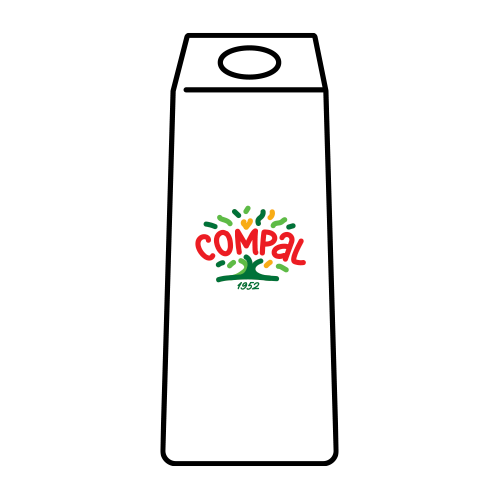
Tetra Pak 1L
INGREDIENTS AND ALLERGENS
Ingredients
Water, strawberry pulp (10%), grape juice (10%), apple (10%) and blackcurrant (6.5%): made from concentrates, sugar, cranberry juice (2%) and raspberry (1 .5%): made from concentrates and acidity regulator: citric acid.
Conservation conditions
Once opened, store in a refrigerator.
Other information
Fruit content: at least 40%.
NUTRITIONAL TABLE
Nutritional info per 100 ml
| Energy | 153kJ - 36kcal |
| Lipids | <0,5g |
| - of which saturated | <0,1g |
| Carbohydrates | 8.7g |
| - of which sugars | 8.7g |
| Fibre | - |
| Proteins | <0,5g |
| Salt | <0,01g |
| Vitamin C | - |
Other Flavours
JUICES & NECTARES
QUESTIONS AND CURIOSITIES
What is the difference between nectar and a 100% juice?
Both are drinks with a high fruit content and that's what distinguishes them from soft drinks and water.
Nectar can have between 25 and 99% of fruit, with the minimum legal limits defined depending on the type of fruit. For example, the minimum fruit threshold for peach nectar is 50%, while that for mango nectar is 25%.
100% juices are those that consist only of fruit juice, with no added water.
Our main raw material is fruit, its concentrates or pulps. We have juices made from concentrates and others made from pulps. Some of the popular flavoured pulps such as peach and pear are made in our factory, that is, we receive the trucks with fruit directly from the orchard and extract the pulp, always respecting the highest quality standards. Once the pulp or concentrate is obtained, we make the blend, that is, the mixture that will result in the final juice. Finally, pasteurization and packaging is carried out under strict aseptic conditions.
In short:
- Fruit reception
- Selection
- Cleaning
- Transformation into pulp
- Formulation
- Pasteurization
- Package filling
- Packaging (secondary packaging)
- Palletizing
- Arrival of the final product at the Establishments
If Juices & Nectars have no preservatives, how do they keep for so long without spoiling?
Juices and Nectars don't go bad thanks to a technique called pasteurization, which consists of a heat treatment given to the juice, which allows it to keep for longer, keeping the naturalness of a fruit juice squeezed at home.
I have cholesterol. How much Compal juice and nectar can I drink?
Cholesterol is one of the fats naturally present in our blood, having several functions in our body. When present in the blood at levels higher than desirable, we say that the individual has dyslipidemia.
There are several types of cholesterol circulating in the blood. Popularly, cholesterol assumes the following designations: "good cholesterol" (HDL-high density or high density) and "bad cholesterol" (LDL-low density or low density). When in excess, LDL cholesterol accumulates in the walls of blood vessels, reducing its calibre, which hinders the passage of blood and constitutes a risk factor for Cardiovascular Disease. Excess LDL cholesterol can be hereditary, or in most cases, it is the result of unhealthy eating habits.
Blood cholesterol, although it is often associated with overweight/obesity, does not depend only on body weight. In fact, a person who has a diet high in fat, cholesterol or high in trans fat and low in fibre-rich foods, such as fruit and vegetables, may suffer from dyslipidemia, even if they have a healthy Body Mass Index.
For adequate blood cholesterol levels, it is recommended, among others:
- Adequate consumption of fruit and vegetables;
- Preference for low-fat dairy products over fatty ones;
- Use of olive oil and unsaturated vegetable oils (peanuts, corn, sunflower, soy) instead of butters, hydrogenated fats, bacon;
- Choose whole grain breads and cereals (oats, wheat, rye) instead of biscuits, butter cookies, etc.
- Preference for fish and lean meat over the consumption of red meat;
- Regular exercise.
From the above, we can say that the range of Compal juices and nectars does not negatively influence cholesterol levels and can be integrated into a food plan suitable for this pathology. As far as flavours are concerned, any one of them is adequate.